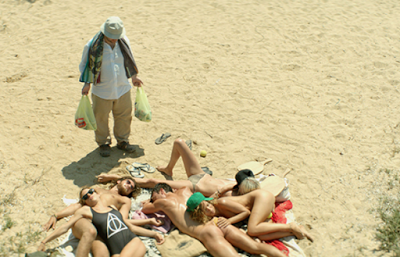The Desert Island Game, Rev. Edition
 Kostis...so close to paradise and yet so far
Kostis...so close to paradise and yet so farYou know the game…I even posted about it five years ago. I must say, however, that my critical thinking always gets in the way of fully enjoying it. I mean if it’s a desert island, where’s the electricity come from? And even if my CD player is solar or water powered, do I really want to sit baking in the sun listening to Dylan, no matter how much I love and honor the guy? So I got to thinking…how can we mix up the parameters of the game to overcome such objections…like what if instead of music you had to choose what skills you would bring to the desert island. Coincidently, Lorna recently exercised that uncanny knack she has for asking me profound questions in the most mundane moments (I believe I was trying to unplug a toilet this time). She asked me if I had any superpowers and what I thought they were. I admitted to not having superpowers, but thought I could lay claim to certain strengths. To her inquiry I responded:A preternatural ability to listen to both sides, honed at the kitchen table as a child forced to arbitrate my parents’ ongoing debate over dad’s drinking routineA natural narrative voice in my head, which came from where I do not knowAn instinct for teaching…with emphasis on bringing out the best in my students rather than impressing them with the best in meIn assessing all those worthy skills, I realized every one of them would be useless on a desert island with no one to listen to, no one to write to, and no one to teach. So what I would really need are skills I don’t have: to build a lean-to, to start a fire from scratch and to tell the difference between the good purple berries and the poison ones. Changing the game from music to skills doesn’t make the game any more fun for me, but it does make it more clarifying. After all, what’s it really matter if you forget to bring that Country Joe and the Fish album with you? But arrive on a desert island without knowing how to fish, and now you’ve got problems.
The Robinson Crusoe/Cast Away survivalist scenario is an ever-popular one. Less so, though perhaps more compelling, are the tales detailing a character struggle for survival, such as in the recent film we watched called Suntan. It’s about a doctor who arrives on a near-idyllic Greek island to make a new start. The island is already equipped with the basics: electricity…fresh water, indoor plumbing, cafes, grocery stores, motorized transportation…lots of other people. It even has a fully equipped clinic for him to pursue his profession. He doesn’t have to deal with the usual desert island hardships, but instead can get right down to a real do-over in life. And Kostis, the doctor, really seems in need of a do-over when he first arrives on the island. In this he is reminiscent of the main character in one of my all time favorite books, The Magus . In channeling his character, Nicholas Urfe, author John Fowles writes:
But then one bleak March Sunday, the scales dropped from my eyes. I read [my] Greek poems and saw them for what they were: undergraduate pieces, without rhythm, without structure, their banalities of perception clumsily concealed under an impasto of lush rhetoric. In horror, I turned to other poems I had written. They were no better; even worse…The truth rushed down on me like a burying avalanche. I was not a poet...Poetry had always seemed something I could turn to in need—an emergency exit, a lifebuoy, as well as justification. Now I was in the sea, and the lifebuoy had sunk, like lead. It was an effort not to cry tears of self-pity…For days after, I felt filled with nothingness; with something more than the old physical and social loneliness—a metaphysical sense of being marooned. It was something almost tangible, like cancer or tuberculosis.
We don’t get as literal a picture of Kostis’s pain in Suntan. He never articulates the personal or professional failure that sends him to the island in search of refuge. Because it’s a movie, his forlorn status is seen, not read, in his pitiful stares, his lumpy body, and his pasty white complexion that wards off a golden Greek tan as if he’s encased in a sausage skin. Like Nicholas in The Magus, the warmth, the adventure, the hedonism he encounters on his island paradise only serves to tease and alienate him even more. Kostis has brought his skill as a doctor; Nicholas has brought his skill as a writer…both to begin anew. But in the end, both are doomed by whatever it was that undid them before they ever got to the island. It all serves to underscore the truth of the old adage: Wherever you go, there you are. You can bring all the records you want to your desert island, but if who you are is a broken record, it’s not going to be any fun at all.
Published on November 16, 2017 10:12
No comments have been added yet.



